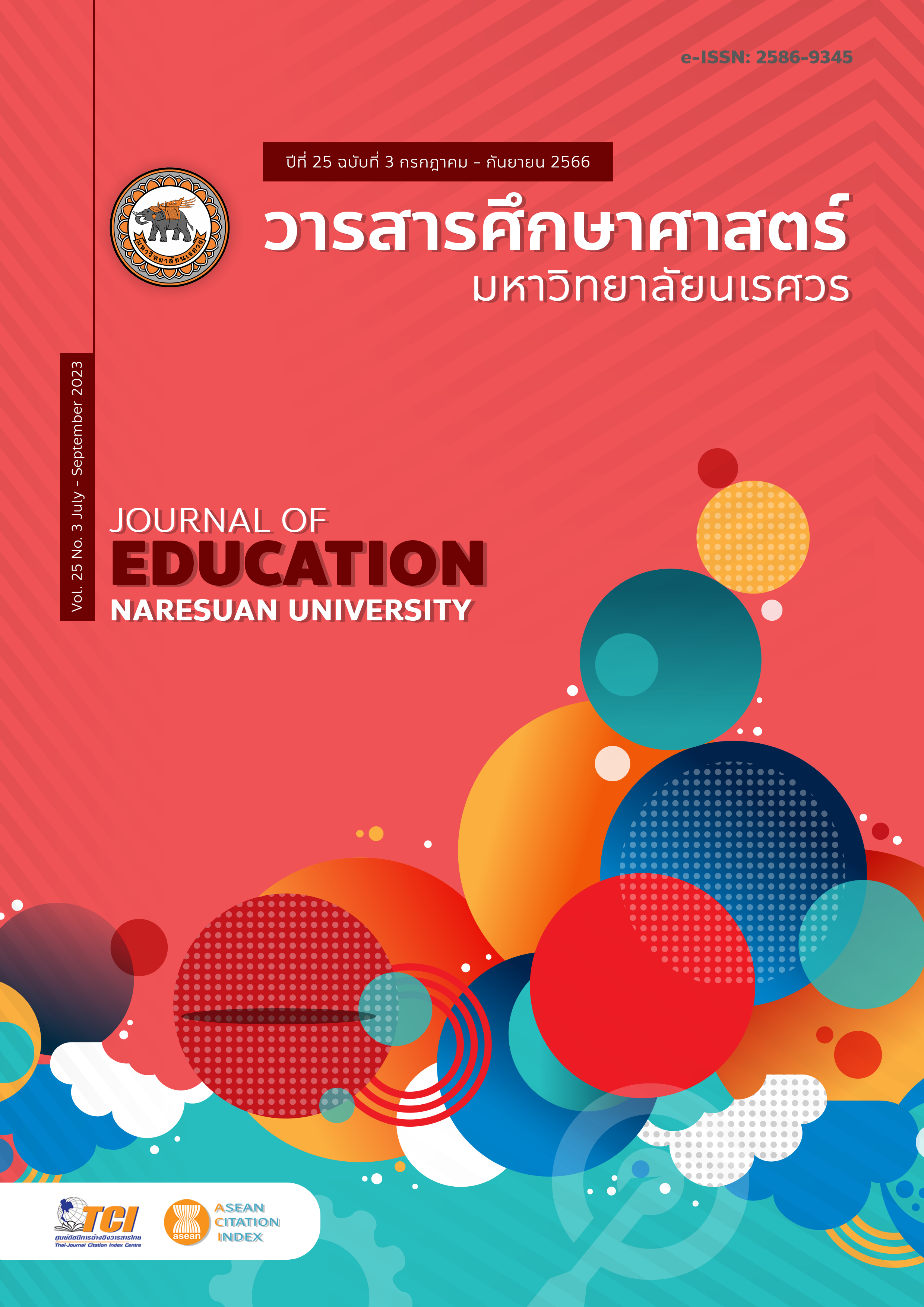DEVELOPING SOCIAL CONSTRUCTIVIST MATHEMATICAL LAB INSTRUCTION WITH GEOGEBRA TO ENHANCE MATHEMATICAL CREATIVE THINKING IN CIRCLE OF GRADE IX STUDENTS การพัฒนาการจัดการเรียนรู้ที่เน้นปฏิบัติการทางคณิตศาสตร์ตามแนวทฤษฎีโซเชียลคอนสตรัคติวิสต์ร่วมกับโปรแกรม GeoGebra ที่ส่งเสริมความคิดสร้างสรรค์ทางคณิตศาสตร์ เรื่อง วงกลม ของนักเรียนระดับชั้นมัธยมศึกษาปีที่ 3
Main Article Content
Abstract
This research aimed to study the learning management approach that focused on Math Labs based on social constructivism and integrated with GeoGebra to enhance Mathematical creative thinking of grade 9 students in Circle and study the development of Mathematical creativity thinking of grade 9 students in Circles when performing Math Labs based on social constructivism and integrated with GeoGebra.The participants were 34 students. The research methodology was action research comprising of 4 spirals. The instruments used in the research were learning management plans, reflective learning journals, activity sheets, students' artifacts and mathematical creative thinking test. Data were analyzed by content analysis and triangulations. The results revealed that the learning management approach needed to focus as follows. The teacher should check prior knowledge from students' experiences and assign them to search information from variety and reliable sources, the teacher should encourage students to construct knowledge along with problem solving by using GeoGebra program in the way of cooperation and provide opportunities for students to exchange knowledge to each other. In addition, this research found that most students appeared to have development of generate diverse ideas, generate creative ideas and evaluate and improve ideas respectively.
Article Details

This work is licensed under a Creative Commons Attribution-NonCommercial-NoDerivatives 4.0 International License.
The owner of the article does not copy or violate any of its copyright. If any copyright infringement occurs or prosecution, in any case, the Editorial Board is not involved in all the rights to the owner of the article to be performed.
References
Angganapattarakajorn, V. (2012). All things to know for a math Teacher: Curriculum Instruction and research. Bangkok: Charansanitwongkarnpim. [in Thai]
Barak, M. (2016). Science teacher education in the twenty-first century: A pedagogical framework for technology-integrated social constructivism. Research in Science Education, 47(2), 283-303.
Institute for the Promotion of Teaching Science and Technology. (2018). PISA 2018: Executive Summary. Bangkok: Institute for the Promotion of Teaching Science and Technology. [in Thai]
Kijkuakul, S. (2014). Learning science directions for teacher in the 21 Century. Phetchabun: Juldiskarnpim. [in Thai]
Kusumavalee, S. (2015). Where is Thailand in the creative context of the world? Retrieved September 9, 2020, from https://mgronline.com/management/detail/9580000100595 [in Thai]
Nahthasri, W. (2017). The development creative skills of students with writing mind map. Graduate Studies Journal, 14(64), 43-50. [in Thai]
Nuangchalerm, P. (2015). 21 Century learning in science. Journal of Rangsit University: Teaching & learning, 9(1), 136-154. [in Thai]
Panich, V. (2012). How to create student’ learing in 21 Century. Bangkok: Tathata Publication Company. [in Thai]
Ritcharoon, P. (2016). Assessment for Learning Development. STOU Education Journal, 9(1). 1-17. [in Thai]
Singngam, N. (2016). The development of a web-based the project based on the teaching of synnextic raptors to promote creative thinking for student in Matthayomsuksa 3. Graduate Studies Journal, 13(60), 151-166. [in Thai]
Tibpaeng, R. (2019). The development of mathematical connection ability through contest-based learning in ratio and percentage for tribesman student in grads 8. The 48 National Graduate Research Conference, June 13-14, 2019. Nakhon Pathom: Kasetsart Silpakorn University. [in Thai]
The Organisation for Economic Co-operation and Development. (2019). PISA 2021 creative thinking framework. Paris: The Organization for Economic Co-operation and Development.
Thongchai, A. (2013, November). What is technology and engineering in STEM Education? IPST magazine, 42(185), 35-37. [in Thai]
Uthit, C. (2014). Effects of Organizing Learning Activities on Linear Programming Supplementing Mathematical Skills and Processes by Using the GeoGebra for Mathayomsuksa Six Students at Samutsakhonburana School, Changwat Samut Sakhon (Master thesis). Bangkok: Kasetsart university. [in Thai]


